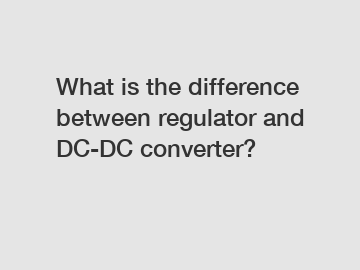What is the difference between regulator and DC-DC converter?
Regulator and DC-DC converter are two commonly used terms in the field of electrical engineering. While they both play crucial roles in regulating voltage levels, there are distinct differences between the two.
Regulators, also known as linear regulators, are circuits that control the output voltage level to remain constant regardless of changes in input voltage or current variations. They achieve this by dissipating excess energy as heat. On the other hand, DC-DC converters, also referred to as switching regulators, efficiently convert one voltage level to another by using semiconductor switches and inductors. Unlike regulators, DC-DC converters store energy and release it in a controlled manner.
The main difference between regulators and DC-DC converters lies in their efficiency and power handling capabilities. Regulators are known for their simplicity and low cost but are limited in their ability to handle high voltage differentials and power conversions. They are commonly used for low-power applications and in situations where noise and ripple are not critical factors.

DC-DC converters, on the other hand, offer higher efficiency and can handle larger voltage differentials and power conversions. By utilizing switching techniques, they minimize energy loss and provide a regulated output voltage. This makes them ideal for applications that require efficient power conversion and tight regulation, such as battery-powered devices, telecommunications systems, and high-performance computers.
The choice between a regulator and a DC-DC converter depends on the specific requirements of the application. When the input and output voltage levels are similar and power efficiency is not a significant concern, a regulator may be sufficient. However, when there is a need for tight regulation, efficient power conversion, or handling large voltage differentials, a DC-DC converter becomes the preferred choice.
The development of DC-DC converters marked a significant advancement in power electronics. Their ability to efficiently convert voltage levels has enabled the design of more compact and energy-efficient electronic devices. Furthermore, DC-DC converters have greatly contributed to the miniaturization of electronic systems, as their high-efficiency performance reduces the need for large heat sinks and bulky components.
In conclusion, regulators and DC-DC converters serve the purpose of regulating voltage levels, but they differ in terms of efficiency and power handling capabilities. The choice between the two depends on the specific requirements of the application. The development and advancements in DC-DC converters have greatly influenced the field of power electronics, enabling the design of smaller, more efficient, and reliable electronic devices.
If you want to learn more, please visit our website XC7VX1140T-2FLG1928C Electronic Components, LM3046MX/NOPB, Metal Oxide Semiconductor Manufacturer.

Comments